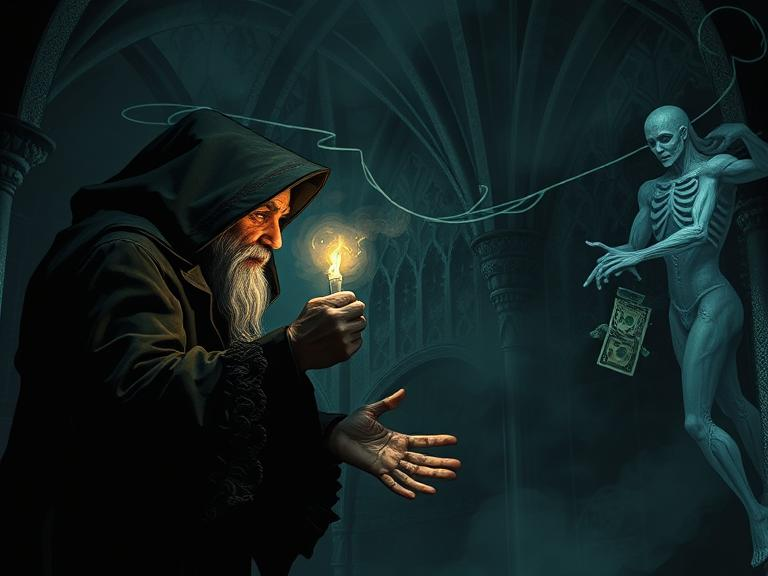
This ain’t about mocking believers. Grief is a powerful, nasty thing. Hope is intoxicating. When you’re hurting, when you’re desperate for answers or one last connection, you want to believe. And that desire, that aching vulnerability? That’s the psychic’s playground. That’s the raw material they sculpt into a convincing performance. Because that’s what it is: a performance. Part therapy session (unlicensed, naturally), part detective work, part Vegas stagecraft. The key technique? It’s called Cold Reading. And it’s a hell of a lot more common sense and sneaky observation than supernatural sensitivity.
Think about it like this: James Randi, the old magician bloodhound who sniffed out frauds for decades, offered a million bucks to any psychic who could prove their powers under controlled conditions. Nobody ever claimed the prize. Why? Because when you take away the mood lighting, the suggestive questioning, and the ability to read the sitter like a book, the “powers” vanish faster than free beer at a biker rally.
So how does Cold Reading work? It’s not one single trick; it’s a whole toolbox of psychological manipulation and shrewd observation.

- The Sherlock Scan: Before you even open your mouth, the reader is sizing you up. Your clothes (Expensive? Worn out? Brand names visible?), your jewelry (Wedding ring? Religious symbols? Old-fashioned locket?), your haircut, your posture, your dialect, the tiny worry lines around your eyes. Are you wearing black? Maybe recently bereaved. Got a faint indentation where a wedding ring used to be? Divorced or widowed. Got a subtle tan line in winter? Maybe just back from Florida – expect questions about travel or elderly relatives down south. Carrying a specific type of bag? Maybe hints at a profession or hobby. It’s amazing what people give away without saying a word. They’re not reading your aura; they’re reading your laundry tag and your body language.
- Barnum Statements (The Psychic Shotgun): Named after P.T. Barnum, who knew a thing or two about pleasing crowds, these are vague, universally applicable statements that sound specific but could apply to almost anyone.
* “You have a tendency to be critical of yourself.” (Who doesn’t?)
* “While you have some weaknesses, you are generally able to compensate for them.” (Duh.)
* “You pride yourself as an independent thinker and do not accept others’ statements without satisfactory proof.” (Flattering, and makes you want to believe the psychic has proof.)
* “You have a box of old photographs, some of which make you sad.” (Groundbreaking!)
* “Security is one of your major goals in life.” (Shocking!)
The reader throws these out like scattering birdseed. Some will land. You, the sitter, latch onto the ones that resonate (“Oh my god, how did she KNOW I feel insecure sometimes?!”) and conveniently forget the misses. It feels personal, but it’s tailored ambiguity. - Fishing and Leading (The Psychic Mine Detector): This is where the reader turns into a detective, throwing out questions disguised as statements, waiting for you to bite.
* “I’m getting a feeling of connection to… medicine? Perhaps a hospital? Does this mean anything?” (Could be you, a relative, a job, a recent visit, anything.)
* “I see the initial ‘M’… or maybe ‘J’? A male energy connected to this…” (Throws out common initials and waits for your reaction. If you nod slightly at ‘M’, they’ll run with Michael, Martin, Mark…).
* “There’s a sense of something unfinished… a message needing to be passed on…” (Perfectly vague, plays on common regrets associated with loss).
They watch your reactions – a flicker of the eyes, a slight nod, a sharp intake of breath. These are the “tells” that guide them. You provide the answers; they just pretend they pulled them out of the ether. - Turning Misses into Hits (The Verbal Jiu-Jitsu): Even the best cold readers miss sometimes. But a pro knows how to recover.
* Psychic: “I see him holding a pipe…”
* Sitter: “No, my father never smoked a pipe.”
* Psychic: “Ah, then perhaps it’s symbolic? Was he a thoughtful man, someone who ‘piped up’ with advice? Or maybe someone around him smoked a pipe?”
See? The original miss is instantly reframed until it fits something, anything. The sitter, eager to connect, often helps, “Oh, his neighbor smoked a pipe!” Bingo. The psychic looks brilliant, even though they were completely wrong initially. - Exploiting the Sitter’s Needs: This is the most crucial, and frankly, the most cynical part. The reader knows you’re likely there because you’re hurting, seeking comfort, closure, or guidance. They play on that. They offer platitudes (“He’s at peace now,” “She’s watching over you,” “She forgives you”). They validate your feelings. They provide the emotional catharsis you crave. In doing so, they build immense trust and lower your skepticism even further. You’re not just a client; you’re a co-creator in the illusion, desperately wanting it to be real.

Think like Orson Welles making F for Fake. It’s all about perception, narrative, and the audience’s willingness to believe. The psychic is the director, guiding your attention, editing out the bad takes, and focusing on the emotional money shot. They’re selling you a story, starring you and your departed loved ones. It’s a powerful, intimate performance.

So, next time you see someone channeling Great Uncle Mortimer, remember the toolbox. Remember the scan, the shotgun statements, the fishing, the spin. It’s not spirits; it’s psychology. It’s observation honed through practice. It’s a deep understanding of human hope and grief, weaponized for profit or applause. Impressive? In a technical, predatory sort of way, maybe. Supernatural? Not a chance. They’re not talking to the dead. They’re just damn good at reading the living – right down to the lint on your collar. And charging you handsomely for the privilege of telling you things you basically told them yourself. Now that’s a trick even Houdini might grudgingly admire.